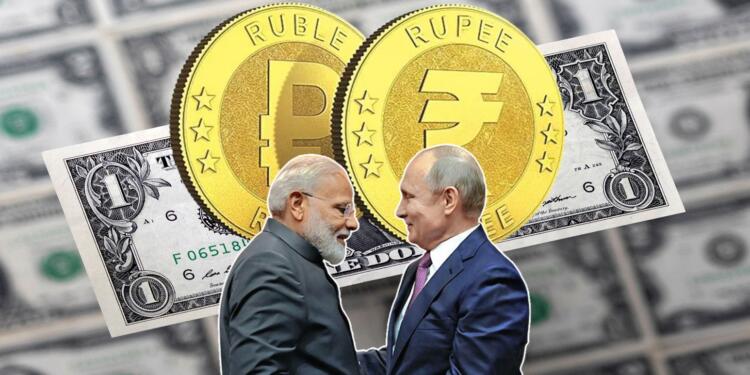The de-Dollarisation of the global economy is actually a long-awaited demand. But, for the last 4 decades, the movement has always failed to gain momentum. However, tides are flowing in different directions this time. Countries are not just de-dollarising, but in fact, are making themselves Dollar proof and India and Russia are leading the way.
BRICS international forum emphasizes Dollar-proof trade
Now the branches of formal multilateral institutions have officially started supporting the cause of bilateral trade in local currencies. The most recent endorsement came from BRICS International Forum. The forum works for structured social, economic, and environmentally sustainable BRICS block. Purnima Anand, its current head recently said that a mechanism for Rupee-Rouble trade has already been established. She further informed that Yuan and Rouble are also looking to follow a similar trajectory.
Stating how Russia paid back India’s trust, Purnima said, “When Russia’s military operation in Ukraine began, naturally there was pressure on India to stop importing Russian oil. But the Ministry of Foreign Affairs had to reject this pressure. The Russian side was assured that supplies would not be stopped and the sanctions regime would in no way affect the relationship between our countries”
RBI’s initiative to push Rupee
Purnima’s observations came in the wake of India internationalizing its Rupee to make transactions easier with Russia. Recently, RBI said yes to establishing a mechanism for doing international trade in Rupee, instead of Dollar. According to the new arrangement, exports and imports will be denominated and invoiced in Indian Rupee. For this purpose, authorised Indian banks will have to open a Rupee Vostro account of the foreign bank.
De-dollarisation of India-Russia trade
The official statement did not vouch for the Rouble, nor did it criticize Dollar’s regime. However, it is widely believed that the initiative will ease Rupee-Rouble transactions, a step towards ending the dominance of Dollar in international trade. The proof of the pudding lies in the fact that India and Russia have been slowly reducing their dependence on Dollar for their bilateral trade.
Before 2019, we used to settle more than 50 per cent of India-Russia trade in Dollars, but in 2021, 53.4 per cent of Indian payments to Russia was made in Rouble while Dollar’s share came down to 38.3 per cent. What western sanctions did was they unintentionally gave India a chance to push its Rupee into the international market.
Positive effects of sanctions
As soon as western sanctions started affecting Russian trade prospects, they started looking for an alternate market since China was not enough. At that time, India also needed cheap oil since its inflation rate was skyrocketing and the problem was so grim that the RBI felt a need to intervene. Interests met and so did Indian and Russian trading partners.
Russian oil which accounted for only 1 per cent of our crude imports is now fulfilling more than 20 percent of our import needs. Having already dethroned Saudi Arabia from second position, it is within touching distance of replacing Iraq as the top oil supplier to India. The icing on the cake is that India is purchasing oil at a much-discounted rate from Russia as well as Iraq. This is primarily the reason why India refused to accept the American demand of capping the price of Russian oil.
Necessity for Rupee
But crude is not the only commodity finding its way into India in the wake of western sanctions. India’s imports of refined products from Russia have tripled in the past few months. Russians exported more than 1 lakh barrels per day (bpd) of refined products over recent months.
Fuel oil comprises 70 per cent of this basket, while the remaining 30 per cent is dominated by biofuels and secondary refinery feedstocks. By 2025, the bilateral trade is set to touch the $30 billion mark. On the other hand, Russians also opened their market for Indian companies. All these initiatives gave India the opportunity to ask Russia to accept Rupees in exchange for Rouble.
Naturally, the Dollar would have caused hindrance in the increasing bilateral trade. It is better to pull out the thorn by enduring short-term pain rather than bear it for decades and leave future generations exposed to it.
Support TFI:
Support us to strengthen the ‘Right’ ideology of cultural nationalism by purchasing the best quality garments from TFI-STORE.COM




















